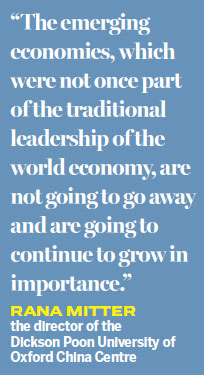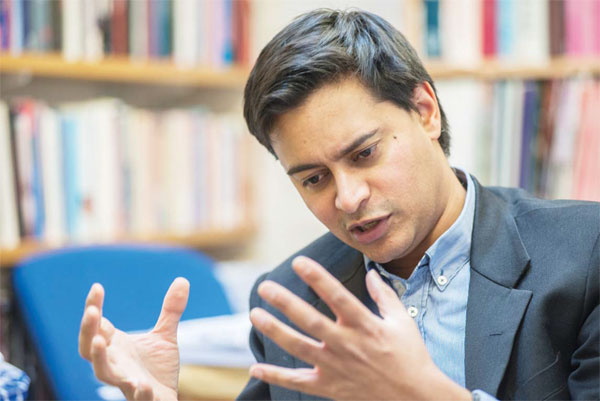Protectionism set to be on agenda

Summit gives China chance to prove that it wants to be a strong part of the international community
Rana Mitter believes China hosting the G20 summit in Hangzhou is a historic event for the world's second-largest economy.
The director of the Dickson Poon University of Oxford China Centre argues it could also be a pivotal moment in the country's relationship with other leading nations.
| Rana Mitter, the director of the Dickson Poon University of Oxford China Centre, believes one of the issues on the G20 agenda will be a call to move away from the austerity policies that have been the dominant orthodoxy. Nick J.B. Moore / For China Daily |
"It cements China's place in the global economic community, but it also comes at a turning point moment when China and the rest of the world are also rethinking the relationship that the two sides have with each other as well."
Mitter, 47 and regarded as one of the world's leading Sinologists, says also the G20 itself is now increasingly a more important body than the G8 in that it more accurately reflects the composition of the global economy.
"Since the financial crisis, the G20 has continued to grow in importance, whereas 20 years ago, the G7 or the G8 (from which China is excluded) were more the focus. The emerging economies, which were not once part of the traditional leadership of the world economy, are not going to go away and are going to continue to grow in importance."
The historian says staging the G20 can be compared to Beijing's hosting of the Olympics in 2008 and also the Shanghai Expo in 2010.
"I would say it is a confirmation that China sits among the global elite, particularly when you are talking about the political and economic sphere."
"The events are on a different scale. The Olympics is something that all can enjoy, an emanation of global ideas through sport. Shanghai was an exposition to show China to the world. This is not really the purpose of the G20. It is more about high-level conversations."
He says that while it might not attract the same audience as the Olympics, it is still a very important event, particularly for the world's key decision-makers.
"I think it matters a lot to the sort of people that attend Davos and other international gatherings. These are the kind of people to which it is most relevant - a very important but more specialist group."

Mitter also believes the Hangzhou summit could be pivotal in terms of the emergence of the G20 as a global governance body.
"The G20 emerged essentially as a reaction to the financial crisis when it appeared to many that the emerging economies and China, in particular, were responding more effectively to the situation than the traditional Old World economies," he says.
"So in a sense it was an indication of what you might call a new way of doing business - the idea that these countries could no longer be excluded."
The academic also argues that G20 - and, in particular, as a result of hosting the summit - gives China the chance to prove to everyone that it wants to be a strong part of the international community, fighting for everyone's interests and not just its own.
"Events like the G20 are really important in showing that China sees itself as part of a mutually beneficial international economic structure and that it's not simply entering into it with purely China's interests at heart.
"It is a sign that China has had to become a bigger player and is going to be held up to global standard rather than simply its own assessment of how it does."
Mitter, who studied Chinese at Cambridge University and was a Kennedy scholar at Harvard, has been director of the Oxford University China Centre, now one of the world's leading institutions for Chinese studies, since 2013.
He is a particular specialist in China's World War II period and has written a number of leading books, including China's War With Japan 1937-45: the Struggle for Survival, which was described by Henry Kissinger as an "important and moving contribution to the historical record".
Mitter had a leading part last year in CCTV's coverage of the 70th anniversary commemoration of World War II in Beijing and also presented a documentary on the conflict on the US satellite TV channel History.
Aside from his China interests, he also presents the nightly arts show Free Thinking on BBC Radio 3 in the UK.
Mitter believes one of the major items of the summit agenda will be how to respond to protectionism and avoid the global economy following the dangerous path of the 1930s that led to Great Depression. Republican presidential nominee Donald Trump has said he wants to impose a 45 percent tariff wall on imported Chinese goods.
"Free trade is often a little bit like Saint Augustine, 'Make me chaste Lord, but not yet'. In other words, countries generally like to gain the fullest advantage they can from protectionism and mercantilism, make themselves strong and then say everyone else should trade freely," he says.
"So it will be interesting at the G20 whether there is any serious discussion about the integration of regional economies and creating a better framework for free trade."
He believes, however, there will be calls for more fiscal expansion to combat sluggish economic growth and a move away from the austerity policies that have been the dominant orthodoxy since the global financial crisis.
"In Britain in the last month or so since the Brexit vote, the government has completely abandoned its old austerity targets. It is now talking about an industrial strategy and infrastructure spending, which looks like a Keynesian or revised Keynesian approach.
"I think the political actors will speak out at the summit in favor of such a policy. The problem is that, if they knew how to do it, they would have already done it. National credit cards are maxed out."
He says that China led the way with fiscal stimulus with its 4 trillion yuan (then $586 billion; 520 billion euro) injection into its economy in 2008 but says that with slowing growth is reaching the limits of this particular approach.
"If you look at all the marvels of China now such as high-speed trains and airports, they have emerged in the past 10 years. It has been able to develop a much stronger infrastructure than its Western competitors."
Mitter adds that the world, however, can no longer expect China to drive global growth.
"The world was still looking desperately for someone to drag them out of economic disaster and therefore China's growth seemed to be central to that.
"China has become a more developed economy in significant ways over the past decade. It is now suffering the problems that many countries have when they reach the middle income zone and the old medicine no longer works."
Mitter reflects that the country has undergone a major transformation from when he began studying the country in the late 1980s.
"It was a very poor country compared to what it is today. The level of growth has been extraordinary over the past 30 years and we should not forget that."
But he adds that as a historian, it should not have been too much of a surprise even then that China would be a key player once more.
"I might not have imagined exactly what was going to take place but I was aware that China had had many periods of great prosperity. In a sense there is an argument that its previous history had been an anomaly and China returning to a position where - because of its size, population and geographical location - it would become a more significant economic actor again was only natural."
andrewmoody@chinadaily.com.cn
(China Daily Africa Weekly 08/26/2016 page8)
Today's Top News
- Crossing a milestone in the journey called Sinology
- China-Russia media forum held in Beijing
- Where mobility will drive China and the West
- HK community strongly supports Lai's conviction
- Japan paying high price for PM's rhetoric
- Japan's move to mislead public firmly opposed































